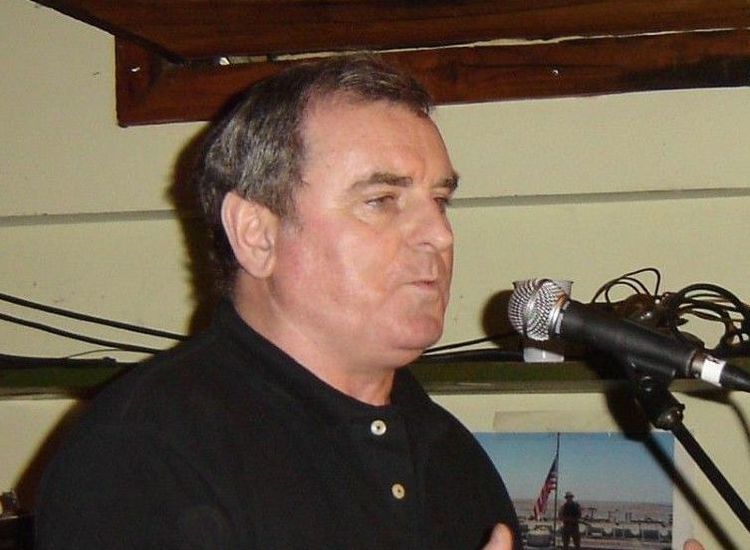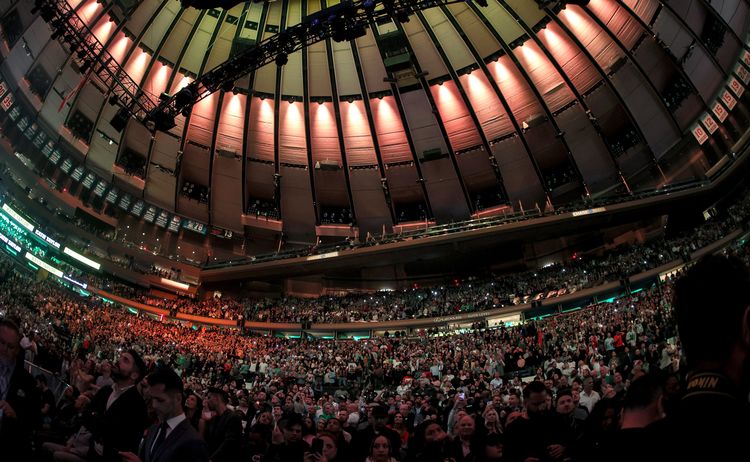Shannon Sharon is dedicated to environmental advocacy and protecting the planet, as shows with the dynamic boldness of “Sacred Earth.”
By Colleen Taylor
Sharon Shannon’s 10th studio album, “Sacred Earth,” is her chance to not just play, but speak. As she told me a couple weeks ago in Dublin, this album is personal and political: “It gives me a chance to say some things.” “Sacred Earth” does indeed speak as well as sing: it speaks of cross-cultural creativity, it speaks of adventurous music, it speaks of myth and native legend, and it speaks, unsurprisingly, of a dedication to the planet. Sharon Shannon has poured her soul and passion into the message of this album, and for that reason most of all, it deserves to be heard.
The album was born in New Mexico, at the Acoma Indian Reservation, where Shannon and her crew met and befriended the resident Native American community. The Irish and Native American musicians collaborated for several sessions, and the beginnings of the album’s interesting Afro-aboriginal influences were, to use Shannon’s phrase, “sown.” Shannon spoke fondly of her time there: “I really like the Indian people we met and their love for the land, and their attitude for all living things. I suppose that was where it came into my head in the first place—to call one of the tunes ‘Sacred Earth.’ The seeds were being sown there.”
The sounds of this album run parallel with Shannon’s ethics: she is dedicated to environmental advocacy and protecting the planet. She practices and promotes a vegan diet and, as her friendship with the Native American community would suggest, she was supportive of the Standing Rock protests. For Shannon, calling the album “Sacred Earth” was her way of going public with these beliefs, with making her music speak for her politics: “Calling the album ‘Sacred Earth’ gives me a chance to say some things.” And indeed, she says them passionately. Although gentle and mild-mannered in person, with an accordion on her lap, Shannon can transform her personality to rambunctious and energetic. Combine that musical vivacity with a set of political stances she staunchly believes in, and Shannon becomes very persuasive. By the end of the interview, she had convinced me to opt for almond milk when I did my shopping later that night.
The boldness of “Sacred Earth” and her dedication to speaking her mind shouldn’t really surprise anyone when you look at Shannon’s biographical history. She reminisced about getting into the music business as a teenager, and I was astounded by her bravery at such a young age. “When I was 17 it was completely out of the question to consider playing music for a living,” she explained, “So I made a compromise with my mother by doing a secretarial course instead of college, and then when that finished, I moved up to Doolin. Hardly any women were doing it at that stage.” Despite the fearlessness in her choice of career, she didn’t seem to recognize what she had overcome by succeeding in a career once dominated by men. When I asked her about being a young woman in traditional music, she humbly said, “I never felt that there were any obstacles. I suppose if you are able to do the job, there is plenty respect there.” Plenty of respect, surely, if you’re a woman with talent like Sharon Shannon.
Shannon has continued to be brave for the entirety of her internationally acclaimed, 10-album career. Her music has been defined by adventure and experimentation, which she explains as her second nature: “I love a lot of different types of music, not just Irish music. I don’t want to limit myself to just Irish music. And I love being in the studio and experimenting.” In fact, this latest album seeks to follow in the footsteps of one of her musical heroes and one of his greatest albums: Paul Simon’s “Graceland.” With each new album, Shannon works to make it sound as different from the last as possible; each record has a distinctive identity. “Sacred Earth’s” identity, then, is the Irish “Graceland.” It brings as many different influences together as possible through an Irish voice and perspective.
For me, as a listener, “Sacred Earth” is Shannon’s most “different” and most adventurous yet. It has traditional, South African, country and zydeco styles all swirled together. Some other critics have claimed “Sacred Earth” is trying to do too many things. But in my opinion, that verdict is, well, unadventurous. The album captivated me with its first track, “Rusheen Bay,” which remains one of my favorites. It’s a jig with South African drums, xylophone, and even some underwater-like sounds. It’s a completely playful track and, as cheesy as it sounds, it really does make the worldwide sounds of the planet sing together. As a whole, the album is dynamic: it moves from genre to genre, tune to tune, culture to culture in fast, fun sweeps. Like Eileen Ivers before her, some of the best tracks on the album are the ones that marry the Irish and Afro influences. Some of my other favorites are “Sea Shepherd” and “Bas Pelles.” If there’s one miss, it’s “The Machine,” which sounds too electro and forced in comparison to the rest of the earthy sounds on the album. But 10 out of 11 is still a solid Ace. Finally, at the end of the day, and at the end of the album, Sharon Shannon sticks to her Irish roots and her identity as a traditional musician. She ends the album with “The Bull Fiddle,” a proper Irish polka.
Before we said good bye, Sharon heading back to the West, and myself back to Dublin City Centre, I had to ask the question that had been on my mind for days: was she sick of “Galway Girl” yet? The answer was as graceful and generous as I expected: “I don’t mind doing it at all. We do it at every gig. People pay to come and hear it. The song has been very good to us and to a lot of people.” Other musicians might see endless requests for “Galway Girl” as a cross to bear, but Shannon sees it as her opportunity. “People are exposed to Irish music because of that song. Otherwise they wouldn’t hear this music. People become fans of Irish music because of that song.” Sharon Shannon turns cliché into chance, and it’s one of many things that make her a great and gracious musician.
“Sacred Earth” is now available in the States, and Shannon will be touring the Northeast to promote the album this summer and again in November. She’ll be in Maine, Pennsylvania, Massachusetts and our own New York state the first week of July. Tour details are available at sharonshannon.com. You may go to hear “Galway Girl,” but my hope, like Shannon’s, is that you’ll leave humming tunes from “Sacred Earth.”
Colleen Taylor writes the Music Notes column each week in the Irish Echo.










